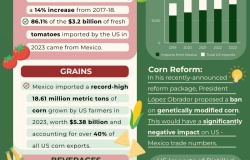Canada-U.S. Competitiveness: The Productivity Gap
Glen Hodgson, of the Conference Board of Canada, and co-author Jack Triplett, of the Brookings Institution, assessed why the United States has enjoyed a surge in productivity over the past decade, while Canada's own productivity growth fell behind that of the United States.
Overview
Event co-sponsored with the the Canada Institute on North American Issues
Canada remains a chronic underachiever when it comes to productivity, argued Glen Hodgson of the Conference Board of Canada. Hodgson and co-author Jack Triplett of the Brookings Institution were on hand for the publication launch of the Canada Institute's seventh issue of its One Issue, Two Voices series on June 28, 2007. Drawing on expertise from both sides of the Canada-U.S. border, the One Issue, Two Voices series is designed to stimulate dialogue on policy issues that have a significant impact on the bilateral relationship. In this issue, "Canada-U.S. Competitiveness: The Productivity Gap," Hodgson and Triplett assess why the United States has enjoyed a surge in productivity over the past decade, while Canada's own productivity growth fell behind that of the United States, beginning at the turn of the 21st century.
Understanding Canada's Productivity Gap with the United States
Hodgson described Canada's economic performance as one of stark contradiction. At the macroeconomic level, all indicators suggest the country's economy is booming. Canada has enjoyed strong economic growth, low inflation, a strengthening currency, and unemployment levels at a 33-year low. However, a closer examination of Canada's economy reveals some alarming trends, in particular weak labor productivity and declining income growth relative to the United States over the last ten years. Citing a recently released report from Statistics Canada, Hodgson explained that although the income gap between Canada and the United States has narrowed since 2000, Canadians have made up this gap by working more hours, rather than working more efficiently. Canada's weak labor productivity, he argued, is especially concerning when one considers that the country is already facing a "labor market crunch" in several provinces and is in danger of a worker shortage by 2010, as an increasing number of "baby boomers" retire. He noted that future net employment increases in Canada will come from immigration.
Hodgson noted that there is approximately a $9,000 per capita difference in labor productivity between Canada and the United States, an amount, he said, that is equivalent to what Ontario spends on health care. He maintained that if Canada were able to reach the productivity levels of the United States, it could serve as a way to cover the expenses of Canada's increasingly costly social programs. In fact, said Hodgson, Canada could "effectively double" the money spent on its healthcare system if it achieved the same productivity levels as the United States.
In contrast to Canada, the United States enjoyed a considerable increase in worker productivity since 1995, primarily in the services sector, noted Triplett. Nevertheless, the factors behind the extraordinary U.S. productivity growth relative to Canada remain largely unknown. Triplett said that economists often try to use the theory that excessive government regulation hinders productivity growth in order to explain the U.S. surge in productivity in the mid-1990s. However, this theory fails to explain what major change in U.S. regulations occurred in 1995 that could account for such a surge. That a significant change in U.S. regulations did not occur around 1995 led Triplett to conclude that simply "removing regulations" is not sufficient to explain productivity growth and should be viewed as simply one variable that can enable its growth, rather than as its sole cause.
Unfortunately, noted Triplett, the other variables that may contribute to productivity growth are not adequately understood or measured by economists. Specifically, economists must obtain a better understanding of how "intangible investments," such as research and development, patents, and management innovations, contribute to productivity growth. Until more is known about these variables and a "better research foundation" is established, the results of government programs intended to encourage productivity growth will remain unpredictable, said Triplett.
Moving Forward
Improving Canada's labor productivity will require domestic reform that would enable the country to have a single internal Canadian market, said Hodgson. To this end, Hodgson urged Canadian provinces to reduce interprovincial trade barriers, eliminate capital taxes, and improve regulatory alignment among the provinces. Taking these measures, argued Hodgson, is a critical first step for Canada to improve its economic competitiveness both within North America and internationally: "Unless you're as efficient as possible at home, it's going to be pretty hard to compete in the U.S. market and globally."
In addition to domestic reform, Canada must work to broaden its free-trade agreement (FTA) with the United States. Hodgson maintained that the current FTA has realized its full potential to influence economic structural change in Canada. Consequently, in order to encourage Canadian businesses to improve their efficiency and ensure future access to the U.S. market, Canada must work to enhance its current FTA through the elimination of remaining Canada-U.S. tariff differences, reforming or eliminating rules-of-origin requirements, and exploring the option of harmonizing regulatory standards with the United States.
Hodgson also argued that Canada should explore a common approach with the United States when negotiating regional or bilateral trade agreements. Since the implementation of NAFTA, Canada has signed four bilateral free-trade agreements internationally, while the United States has signed fourteen. This discrepancy reflects the need for Canada to conduct bilateral negotiations differently, said Hodgson. He said that Canada should consider the benefits of partnering with the United States when initiating international free-trade agreements, despite the political challenges inherent in this approach and risk of Canada becoming a "junior partner" when negotiating with third parties alongside the United States.
Contrary to Hodgson's recommendations, Howard Rosen, executive director of the Trade Adjustment Assistance Coalition, cautioned against focusing primarily on trade liberalization as the solution to declining labor productivity. Rosen stressed that increased domestic investment, particularly in equipment, must be viewed as an essential component in any strategy to improve labor productivity. Rosen maintained that countries should consider the possibility that they are moving toward "a new era of international economic policy" where the solution to economic problems cannot simply be solved by more negotiations and trade liberalization. Consequently, countries, including Canada, must resist the tendency to view increases in trade and investment liberalization as "the first defense" to solving every economic dilemma that arises.
Panelists:
Glen Hodgson, Senior Vice-President, Conference Board of Canada
Jack Triplett, Nonresident Senior Fellow in Economic Studies, Brookings Institution
Howard Rosen, Executive Director, Trade Adjustment Assistance Coalition and Visiting Fellow, Peterson Institute for International Economics
Drafted by Ken Crist, Program Associate
David Biette, Director, Canada Institute
202-691-4270
Documents & Downloads
Hosted By

Canada Institute
The mission of the Wilson Center's Canada Institute is to raise the level of knowledge of Canada in the United States, particularly within the Washington, DC policy community. Research projects, initiatives, podcasts, and publications cover contemporary Canada, US-Canadian relations, North American political economy, and Canada's global role as it intersects with US national interests. Read more
Thank you for your interest in this event. Please send any feedback or questions to our Events staff.










